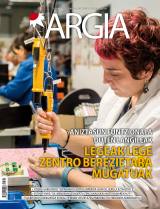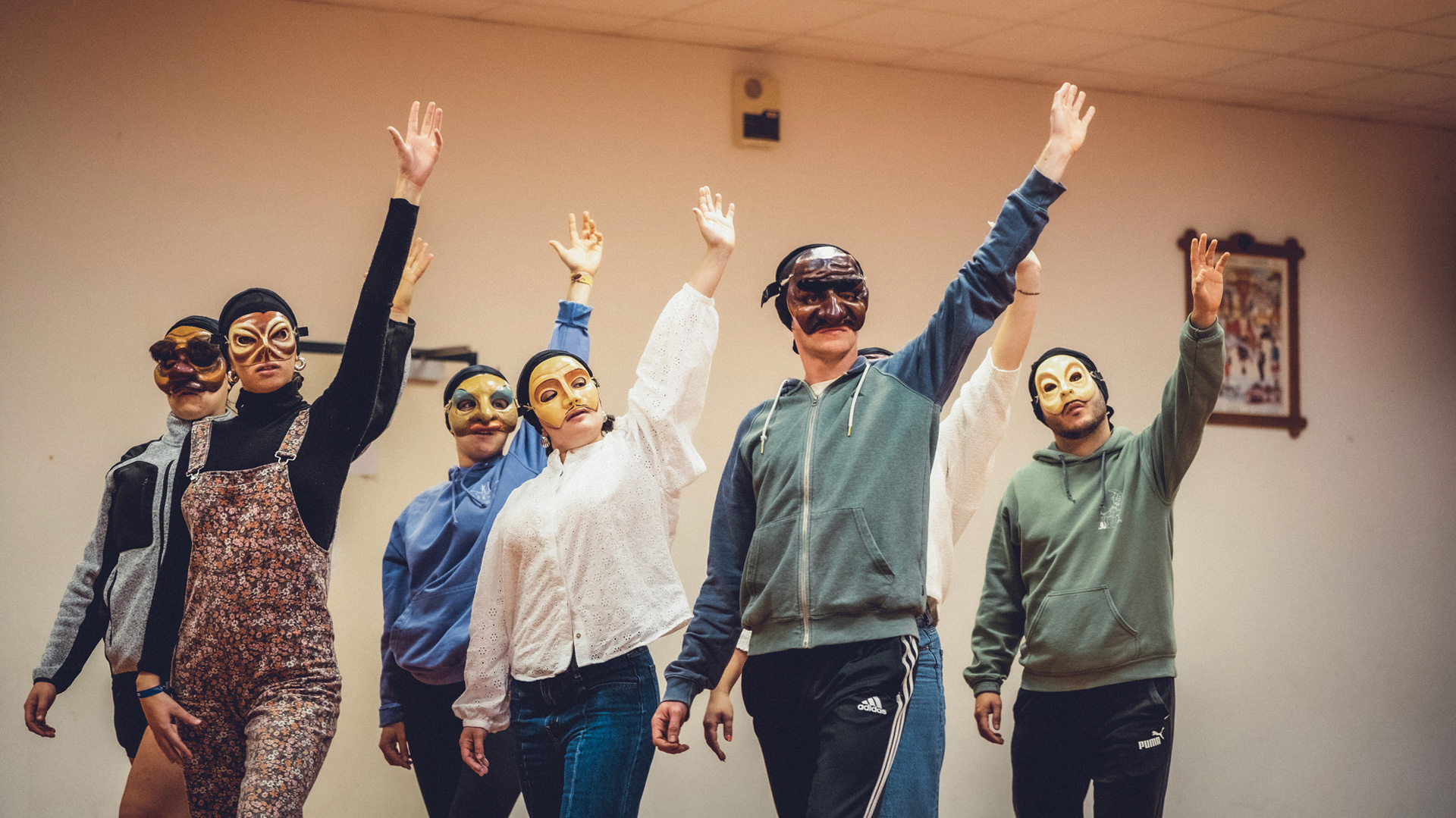"Nasuna is appearing for the first time in Basque literature"
- The Basque American researcher Joseba Gabilondo is shortsighted: he sees things here very badly, because it is very far away, but he perfectly perceives the general aspect of things. In this interview, we've looked at Michigan for the Basque Country.

Idazlea, irakaslea eta literatur ikerlaria. 30 urte egin ditu AEBetan, hainbat tokitan, eta gaur egun, Michiganeko Estatu Unibertsitatean ari da irakasle. Hamaika artikulu eta saiakera argitaratu ditu; azkena, Txalapartaren eskutik: Populismoaz. Euskal independentzia eta sintomen politika globala (2017). joseba.net webgunean dauzkazue haren argitalpen guztiei buruzkoak.
You were young to America.
Yes, I went to master's and PhD, and I've been there for more years than in Euskal Herria. I was 24 years old, 30 years ago, so I'm more American than Basque.
Do you believe?
No, this is not quantitative, the hours are not counted. I can tell you otherwise: I write about issues here, but I couldn't live here.
Why?
This gives me a kind of physical claustrophobia: too many mountains, too many places, small things and all glued… The houses, to begin with. I live there in a very normal house, but it has a garden in front and one behind it. In my city there is nature, when I go down to the park below I see deer, coyotes, eagles… I have lived in big cities like Los Angeles and Tokyo, because when I was younger I wanted to be a cosmopolitan and I also got it, but today I have seen myself completely baserritarra, and when I go to Manhattan, I think about how those people can live in the middle of so much water.
On the other hand, in the world you live in, there's a two-degree separation, that is, everybody knows everybody, and you go to a bar where you're going to find, I don't know who, and it tells you that your book didn't like it. Do you know how many Basques are in Michigan, where about 10 million people live?
One?
That, just me. I know that when I get out on the street, nobody will tell me anything about my books or articles.
However, you left without knowing everything. Why United States?
In those days, semiotics was the obsession of all. I was young, I could choose, and I thought that what I knew most about semiotics was where I would go. That individual was Yuri Lotman and was in Estonia. Estonia was part of the Soviet Union in 1987, before 1989. I decided yes, I was going, and here I started studying Cyrillic in San Sebastian, I went to Madrid to talk and dinner with the general commissioner of the state’s Soviet houses… I was willing to go to the communist bloc. But one of them hit me and said, “You’re crazy, you have to go to America, not Estonia!” Do you know who?
No…
Jon Juaristi. It was he who guided me the thesis of the bachelor and gave me such a good subject that, when I got to the EE.UU, I was in the vanguard, those there knew no more than me. I owe him half my life, but then I wrote very critically against his work.
And what theme did he give you?
Derrida. In 1987, it was then that the deconstruction began to start, there were still no translations, all that had to be read in French.

If I am not mistaken you work within Hispanic Studies. Could you explain to me what it is?
I analyze, theoretically, the problem of Spain. Furthermore, I am convinced, by the analysis I have made, that Spain is a state, but that it has failed precisely as a nation, which has never been built as a nation. This goes against everything or the majority of Hispanism.
What do other Hispanists think?
They do not believe me at the moment, of course, but I believe that we have made great progress. Here, because of the geopolitical situation, you do not see it so directly, but there it is clear that Spain and Castilian, if today they are important, do so thanks to Latin America.
I'm going to tell you an anecdote about a student of mine. My Hispanic friends laughed at him, but I think that student was right: they asked the student where Spain was and he responded that he had to be south of Mexico, there, in Latin America. And that's right.
Could you explain to me in a little more detail the failure of the Spanish nation?
To put it very psychoanalytically, the Spanish state has been an empire, it has never been a nation. The Empire was dissolved in the nineteenth century, most at the beginning of the century (1810-1825) and the last events in 1898. Spain has not yet overcome its post-imperialist condition, has not accepted it, has not internalized it and has inserted it in its report. Spanish nationalism is based precisely on this denial and is defined by the need for this denial; therefore, Spanish nationalism is always a post-imperialist nationalism based on the denial of the Other.
Martutene-New York. In the book on the utopia of Basque post-nationalism and the crisis of neoliberal globalization (UPV/EHU, 2013) he wrote, among other things, that the question of whether Basque writers have bravely written about conflict is a trap.
On the one hand there is an obvious question, an ideological question, and then, behind that ideology, there are several political manoeuvres that have been adopted unconsciously or implicitly.
What is implicitly behind that question? Well, asking if Basque writers have written meaningful about conflict is like asking if women can write. In short, the more general question would be whether the Other (Basques, women…) can write something. The same question implicitly and politically states that the other cannot write anything, which is precisely why the question is asked, otherwise it would not be. And, therefore, this question will always suppose, implicitly and previously, no: no, the Basque literature does not express conflict well and never does. This question, as a last corollary, implies that there is no Basque literature, or that the Basque literature is not able to express the Basque reality and, therefore, it is null, a symbolic practice.
"The Spanish state has been empire, never nation"
How can we respond?
You have to turn it around, because the more you try to prove that the Basque writers have written about the conflict, the more you will dominate, you will internalise your subordination and that subordination will become your character and your biography.
There are therefore two options for turning the question around. One is Zizek's. Question: “Has the Basque literature represented the conflict well?” Answer: “Yes, I really like tomatoes.” Another option is to write about this and somehow show what's behind the ideological maneuver. And to say aloud that this is not an isolated question, but a very universal mechanism that is always operated with respect to the other. Hence the success of the novel Patria by Fernando Aramburu: to reclaim the impotence of Basque literature and then to present his unbearable novel as a legitimate expression of the conflict.
Do you think the literature is losing its strength?
So this is nothing more than the regret of the literates. The problem is not that, but what role has literature played in Basque culture in the twentieth century? Well, until the end of the century, its main function has been to write the allegory of the nation, since at that time there was no other political path to represent it. Now, however, you can politically represent the nation. On the other hand, theoretically, it can be said that Atxaga, etc., have managed to represent the nation in the literature (Obaba), but then have not united the nation and the State: as a consequence of all this, nowadays, literature does not perform a political function, which in itself did not touch it. So let the literates stop crying. They have to understand that they are in another space and that literature has other functions in the Basque Country.

And what function would correspond to the literature now?
What would correspond to him is not so interesting, I am more interested in the role that the literature is already playing. Of course, individual space is the second main space left to you when you stop representing the nation, much closer to the biography, etc. We have not yet understood this space well, because, as a provocation, in Euskal Herria there has not been a single I until recently: for that we need a bourgeoisie, a private space, and we have always lived manifesting and saying what the neighbors and neighbors. The Ni, if it happens in the Basque Country, has started to be created for the first time, and it seems to me that the literature should better understand what it is already doing and go deeper into it. Literature should occupy its space much more seriously. For example, it has not yet been well explained why Eider Rodríguez's stories have been successful, and in them we will find a self and a reality that we do not want or expect.
On the other hand, new forms of realism have been created, not to build a nation, but to remove all the rags of the nation. For example, the black novel serves to explain the dirty periphery of society, and in that filth, many times, it expresses much better what the city is, what the nation is.
You have also written about the film Eight Basque surnames. In this film, the Spaniards laugh at the Basques and the Andalusians, and I would like to ask you what you think of what has happened in doing the opposite: How do you see that I'm the Euskalduna of ETB1 and you? the controversy that has arisen as a result of this week's programme.
To begin with, we must understand that Eight Basque surnames is a Spanish one, and to understand what has happened with [See] Gaztañaga, we have to see who can manage and use the Spanish, and who can not.
What is Spanish?
What about the creation of Spain? Carmen. It was also written by a Frenchman. The Spaniards received the presentation that another made of them and then developed it through zarzuela, opera and cinema.
And what is Carmen?
There is no Spanish in Carmen. In Carmen there is a Basque and an Andalusian. What Are the Most Known Others in Spain? One is Andalusian, gypsy, African, and the other is an uncontaminated breed more Spanish than the Spanish, a true Spanish not Spanish: Basque. Carmen, in her novel, seduces Don José in Euskera and then Don José kills Carmen. That's when you have Gypsy and Basque women who are authentic violent, and that's why Spanish emerges.
Carmen dates back to 1845, when Spain had already lost most of the colonies, and the work focuses on: That only the Spaniards can be defined according to the Other Inmates of Spain (Basque, Gypsies…). Therefore, Spanish identity has always been built through the enjoyment of non-Spanish Spaniards and the enjoyment of violence among them. It is an ethnic porn that Spaniards always enjoy voyeur, because it is based on a work in which Spanish does not appear. In the twenty-first century, neoliberalism and the crisis generated a certain political and historical concern in Spain, there was no horizon, and what the Spaniards did is to return to its essence and create eight Basque surnames.
Having said that, what has happened to Euskalduna and you? With a session?
A taboo has been broken. Since the 19th century, the Spaniards have always said that Spain is a failed project, that it is the third world, that Dumas walked in a straight line and that Africa begins in the Pyrenees, that Spain has no hope… Ortega y Gasset, the most Spanish of the Spaniards, said. The message is therefore nothing new, it is not scandalous. The breaking of tobacco is the reason for the scandal.
What is the taboo?
Porno is ethnic Spanish, the Spaniards are spectators (subjects) and, therefore, the Basques have to be characters (objects). The Basques cannot invest positions, we cannot become spectators and do porn with the Spanish characters, that is forbidden anthropologically. Who has broken that taboo? Gaztañaga. Gaztañaga said that the Spaniards were palaetos or something like that and everything was invested. A profound Spanish anthropological taboo was broken: the Basques were not doing porn for the Spaniards, but we were watching the Basque porn in which the Spaniards were characters.
Halako batean, kafetegia bete egin da, eta kanpora atera gara elkarrizketa lasai bukatzeko. Grabagailua amatatuta, ordea, hizketa ez da eten: elkarrizketatua hasi zaio orain elkarrizketatzaileari bertako kontuez galdezka. “Zuk uste zenuen ni elkarrizketatzera zentozela, baina, egiatan, nik elkarrizketatuko zaitut zu” esan dio, probokatzaile. Miopeak halaxe osatzen baitu irudia, bertakoekin elkarlanean.
Budgets and the closure of annual accounts are nothing more at this time, from the domestic economy to most of the socio-economic spaces that we share. Large companies have begun to extract calculators and implement major plans for 2025. Small and medium-sized institutions and... [+]
By:
Mirari Martiarena and Idoia Torrealdai.
When: 6 December.
Where: In the San Agustín cultural center of Durango.
------------------------------------------------------
The fourth wall breaks and interferes directly, standing and fearless. ZtandaP is a way of counting... [+]






















